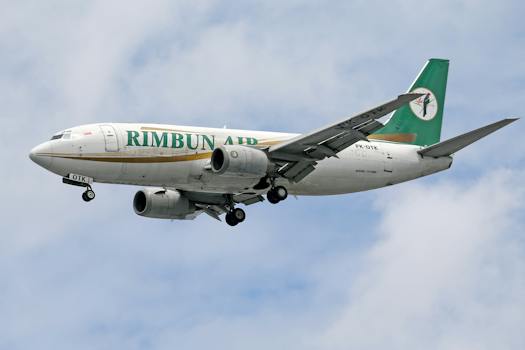

-
Table of Contents
Navigating the turbulence: Addressing the crisis surrounding Boeing's 737 Max.
Introduction
The crisis surrounding Boeing's 737 Max has been a significant event in the aviation industry. The aircraft model faced two fatal crashes within a short period, leading to the grounding of the entire fleet and raising serious concerns about its safety and design. This crisis has had far-reaching consequences for Boeing, including financial losses, reputational damage, and regulatory scrutiny. The investigation and subsequent actions taken by Boeing and aviation authorities have been closely followed by the public and industry stakeholders, as they seek to understand the causes of the crashes and ensure the safety of future flights.
The Impact of the Boeing 737 Max Crisis on Airline Safety
The crisis surrounding Boeing's 737 Max has had a significant impact on airline safety. The grounding of the aircraft following two fatal crashes has raised concerns about the safety of not only the 737 Max but also the broader aviation industry. This article will explore the various ways in which the crisis has affected airline safety.
Firstly, the grounding of the 737 Max has forced airlines to make significant adjustments to their operations. With a large number of these aircraft in their fleets, airlines have had to cancel flights, reassign aircraft, and find alternative solutions to meet their customers' needs. This disruption has put additional strain on the industry, potentially leading to increased fatigue among pilots and crew members, which can compromise safety.
Furthermore, the crisis has highlighted flaws in the regulatory process. The Federal Aviation Administration (FAA) has faced criticism for its initial certification of the 737 Max and its handling of the subsequent investigations. This has raised questions about the effectiveness of the regulatory oversight and the level of trust that can be placed in the certification process. The crisis has underscored the need for more rigorous and independent oversight to ensure the safety of aircraft.
In addition, the crisis has had a significant impact on public confidence in the aviation industry. The two crashes and the subsequent grounding of the 737 Max have received extensive media coverage, leading to widespread awareness of the safety issues surrounding the aircraft. This has eroded public trust in Boeing and the aviation industry as a whole. Passengers may now be more hesitant to fly on the 737 Max or even on other aircraft, fearing that similar safety issues may exist.
The crisis has also highlighted the importance of effective communication and transparency in maintaining airline safety. Boeing has faced criticism for its handling of the situation, with accusations of withholding information and downplaying the risks associated with the 737 Max. This lack of transparency has further eroded public trust and has raised concerns about the company's commitment to safety. Effective communication and transparency are crucial in ensuring that potential safety issues are identified and addressed promptly.
Furthermore, the crisis has prompted a reevaluation of pilot training and the role of automation in aviation. The 737 Max's automated flight control system, known as MCAS, has been identified as a contributing factor in the crashes. This has raised questions about the level of training provided to pilots and their ability to handle unexpected situations. The crisis has highlighted the need for comprehensive and ongoing training to ensure that pilots are equipped with the necessary skills to safely operate modern aircraft.
In conclusion, the crisis surrounding Boeing's 737 Max has had a significant impact on airline safety. The grounding of the aircraft, flaws in the regulatory process, erosion of public confidence, lack of transparency, and reevaluation of pilot training and automation have all contributed to the concerns surrounding airline safety. It is crucial that the industry learns from this crisis and takes the necessary steps to address these issues to ensure the safety of passengers and restore public trust in aviation.
Analyzing the Factors Contributing to the Boeing 737 Max Crisis

The Boeing 737 Max crisis has been a significant event in the aviation industry, raising concerns about safety and accountability. To fully understand the factors contributing to this crisis, it is essential to analyze various aspects of the situation.
One of the key factors that led to the crisis was the design flaw in the Maneuvering Characteristics Augmentation System (MCAS). The MCAS was implemented to address the aircraft's tendency to pitch up, but it relied on a single sensor, making it vulnerable to erroneous readings. This flaw resulted in two fatal crashes, Lion Air Flight 610 in October 2018 and Ethiopian Airlines Flight 302 in March 2019.
Another contributing factor was the Federal Aviation Administration's (FAA) certification process. The FAA delegated some of the certification responsibilities to Boeing, allowing the company to self-certify certain aspects of the 737 Max. This arrangement raised concerns about the independence and thoroughness of the certification process, as it appeared that Boeing had a vested interest in getting the aircraft approved quickly.
Furthermore, the relationship between Boeing and the FAA has come under scrutiny. It has been alleged that Boeing exerted undue influence over the FAA, leading to a lax regulatory environment. This cozy relationship may have contributed to the oversight and lack of scrutiny regarding the MCAS design flaw.
The crisis also highlighted the importance of pilot training and awareness. It was revealed that many pilots were not adequately trained on the MCAS system, and some were not even aware of its existence. This lack of knowledge and training put pilots in a difficult position when faced with an unexpected activation of the MCAS, as they were not equipped to handle the situation effectively.
Additionally, the crisis shed light on the issue of transparency and communication. Boeing has been criticized for not being forthcoming about the MCAS system and its potential risks. The company failed to provide sufficient information to pilots and airlines, which hindered their ability to make informed decisions regarding the operation of the aircraft.
The aftermath of the crisis has seen a significant impact on Boeing's reputation and financial standing. The grounding of the 737 Max fleet worldwide resulted in billions of dollars in losses for the company. Moreover, the crisis has eroded trust in Boeing, with airlines and passengers questioning the safety of the aircraft.
In response to the crisis, Boeing has taken several steps to address the issues and regain public trust. The company has made changes to the MCAS system, including adding redundancy and ensuring that it relies on multiple sensors. Boeing has also committed to improving pilot training and communication, aiming to ensure that pilots are adequately prepared to handle any situation.
In conclusion, the Boeing 737 Max crisis was a result of multiple factors, including a design flaw in the MCAS system, shortcomings in the FAA's certification process, a questionable relationship between Boeing and the FAA, inadequate pilot training, and a lack of transparency and communication. The crisis has had far-reaching consequences for Boeing, highlighting the importance of safety, accountability, and transparency in the aviation industry. Moving forward, it is crucial for all stakeholders to learn from this crisis and work together to prevent similar incidents in the future.
Exploring the Long-Term Consequences of the Boeing 737 Max Crisis
The crisis surrounding Boeing's 737 Max has had far-reaching consequences that extend beyond the immediate aftermath of the two fatal crashes. As the aviation industry grapples with the fallout, it is becoming increasingly clear that the long-term implications of this crisis are significant and will shape the future of Boeing and the industry as a whole.
One of the most immediate consequences of the 737 Max crisis is the damage to Boeing's reputation. The company, once seen as a leader in the aviation industry, is now facing intense scrutiny and criticism. The mishandling of the crisis, including the delayed grounding of the aircraft and the lack of transparency in addressing the issues, has eroded trust in the company. This loss of trust will have long-lasting effects on Boeing's ability to attract customers and secure future contracts.
Furthermore, the financial impact of the crisis cannot be understated. The grounding of the 737 Max has resulted in billions of dollars in losses for Boeing. The company has had to halt production of the aircraft, leading to layoffs and disruptions in the supply chain. Additionally, Boeing has faced numerous lawsuits from victims' families and shareholders, further adding to the financial strain. It will take years for Boeing to recover financially from this crisis, and the long-term consequences on the company's bottom line are yet to be fully realized.
The 737 Max crisis has also highlighted systemic issues within the aviation industry. The certification process for new aircraft has come under scrutiny, with questions raised about the Federal Aviation Administration's (FAA) oversight and Boeing's influence over the process. This crisis has exposed a lack of transparency and accountability, leading to calls for reform and stricter regulations. The industry as a whole will need to address these issues to restore public confidence in air travel.
In addition to the immediate impact on Boeing, the crisis has had a ripple effect on the broader aviation ecosystem. Airlines that had placed orders for the 737 Max have had to adjust their operations and find alternative solutions to meet their capacity needs. This has resulted in increased costs and disruptions for airlines, as well as inconvenience for passengers. The grounding of the 737 Max has also created a gap in the market, with competitors such as Airbus poised to benefit from Boeing's misfortune. This shift in market dynamics could have long-term implications for the balance of power within the industry.
Looking ahead, the crisis surrounding the 737 Max has prompted a reevaluation of safety standards and practices. Regulators and industry stakeholders are now more focused than ever on ensuring the safety of aircraft and restoring public trust. This renewed emphasis on safety will likely lead to more rigorous testing and certification processes, as well as increased scrutiny of manufacturers. While these changes are necessary to prevent future tragedies, they will also add to the cost and complexity of bringing new aircraft to market.
In conclusion, the crisis surrounding Boeing's 737 Max has had far-reaching and long-term consequences for the company and the aviation industry as a whole. The damage to Boeing's reputation, the financial impact, and the systemic issues exposed by this crisis will shape the future of the company and the industry. As stakeholders work to address these challenges, the focus on safety and accountability will be paramount. Only time will tell how the industry will recover and adapt in the wake of this crisis.
Q&A
1. What is the crisis surrounding Boeing's 737 Max?
The crisis surrounding Boeing's 737 Max involves two fatal crashes (Lion Air Flight 610 and Ethiopian Airlines Flight 302) that occurred in 2018 and 2019, respectively, leading to the grounding of the aircraft worldwide.
2. What caused the crashes of Boeing's 737 Max?
The crashes were primarily caused by a faulty automated flight control system known as the Maneuvering Characteristics Augmentation System (MCAS), which erroneously activated and repeatedly pushed the nose of the aircraft down, leading to loss of control.
3. How has Boeing responded to the crisis?
Boeing has faced significant criticism and legal challenges due to the crisis. The company has worked on software updates to fix the MCAS issue, provided additional pilot training, and has been cooperating with investigations. Additionally, Boeing has compensated airlines and families of crash victims.
Conclusion
In conclusion, the crisis surrounding Boeing's 737 Max has been a significant setback for the company. The grounding of the aircraft worldwide following two fatal crashes raised serious concerns about the safety and reliability of the model. Boeing's handling of the situation, including the delayed response and lack of transparency, further damaged its reputation. The crisis has had a profound impact on the aviation industry, leading to financial losses for Boeing, legal challenges, and increased scrutiny of regulatory processes. Moving forward, Boeing will need to regain trust, address the technical issues, and implement necessary changes to prevent similar incidents in the future.











